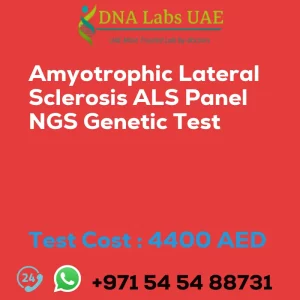DRPLA Dentatorubral-Pallidoluysian Atrophy Gene Analysis Test
Test Cost: AED 1290.0
Symptoms, Diagnosis, and Test Details:
- Test Name: DRPLA Dentatorubral-Pallidoluysian Atrophy Gene Analysis
- Test Components: ATN1 CAG Repeat
- Price: AED 1290.0
- Sample Condition: 4 mL (2 mL min.) whole blood in 1 Lavender Top (EDTA) tube. Ship refrigerated. DO NOT FREEZE.
- Duly Filled Genomics Clinical Information Requisition Form (Form 20): Mandatory
- Report Delivery: Sample collected on Monday by 11am; Report delivered on Friday
- Method: PCR Fragment Analysis
- Test Type: Neurologic Disorder
- Doctor: Neurologist
- Test Department: Molecular Diagnostics
- Pre Test Information: Duly Filled Genomics Clinical Information Requisition Form (Form 20) is mandatory.
DRPLA (Dentatorubral-Pallidoluysian Atrophy) Gene Analysis:
DRPLA gene analysis is a diagnostic test used to identify mutations in the ATN1 gene, which is responsible for causing DRPLA. DRPLA is a rare genetic disorder characterized by progressive damage to certain areas of the brain, leading to symptoms such as involuntary muscle movements, seizures, cognitive decline, and psychiatric problems.
The DRPLA gene analysis test involves analyzing a person’s DNA sample, usually obtained through a blood sample or cheek swab, to identify any mutations or changes in the ATN1 gene. The test can detect various types of mutations, including expansions of the CAG trinucleotide repeat sequence in the gene. These expansions result in the production of an abnormal protein that causes the characteristic symptoms of DRPLA.
The test is typically ordered by a healthcare provider if there is a suspicion of DRPLA based on a person’s symptoms and family history. It can help confirm the diagnosis and provide important information for genetic counseling and family planning. The test may also be used for prenatal diagnosis in families with a known ATN1 gene mutation.
It is important to note that the DRPLA gene analysis test is a specialized test that may not be available in all healthcare facilities. It is typically performed in specialized genetic testing laboratories that have the expertise to accurately analyze and interpret the results. Genetic counseling is often recommended before and after the test to discuss the implications of the results and provide support and guidance to individuals and families affected by DRPLA.
| Test Name | DRPLA DENTATORUBRAL-PALLIDOLUYSIAN ATROPHY GENE ANALYSIS Test |
|---|---|
| Components | *ATN1 CAG Repeat |
| Price | 1290.0 AED |
| Sample Condition | 4 mL (2 mL min.) whole blood in 1 Lavender Top (EDTA) tube. Ship refrigerated. DO NOT FREEZE. Duly filled Genomics Clinical Information Requisition Form (Form 20) is mandatory. |
| Report Delivery | Sample Mon by 11am;ReportFri |
| Method | PCR Fragment Analysis |
| Test type | Neurologic Disorder |
| Doctor | Neurologist |
| Test Department: | MOLECULAR DIAGNOSTICS |
| Pre Test Information | Duly filled Genomics Clinical Information Requisition Form (Form 20) is mandatory. |
| Test Details | DRPLA (Dentatorubral-pallidoluysian atrophy) gene analysis is a diagnostic test used to identify mutations in the ATN1 gene, which is responsible for causing DRPLA. DRPLA is a rare genetic disorder characterized by progressive damage to certain areas of the brain, leading to symptoms such as involuntary muscle movements, seizures, cognitive decline, and psychiatric problems. The DRPLA gene analysis test involves analyzing a person’s DNA sample, usually obtained through a blood sample or cheek swab, to identify any mutations or changes in the ATN1 gene. The test can detect various types of mutations, including expansions of the CAG trinucleotide repeat sequence in the gene. These expansions result in the production of an abnormal protein that causes the characteristic symptoms of DRPLA. The test is typically ordered by a healthcare provider if there is a suspicion of DRPLA based on a person’s symptoms and family history. It can help confirm the diagnosis and provide important information for genetic counseling and family planning. The test may also be used for prenatal diagnosis in families with a known ATN1 gene mutation. It is important to note that the DRPLA gene analysis test is a specialized test that may not be available in all healthcare facilities. It is typically performed in specialized genetic testing laboratories that have the expertise to accurately analyze and interpret the results. Genetic counseling is often recommended before and after the test to discuss the implications of the results and provide support and guidance to individuals and families affected by DRPLA. |







